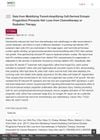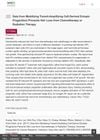 1 citations,
December 2022 in “JAMA Dermatology”
1 citations,
December 2022 in “JAMA Dermatology” The AI system HairComb accurately scores hair loss severity, matching dermatologist assessments.
[object Object] 
Activating certain hair follicle cells could prevent hair loss from cancer treatments.
Boosting certain cell signals can prevent hair loss from chemotherapy and radiation.
Boosting certain cell signals can prevent hair loss from chemotherapy and radiation.
 5 citations,
August 2018 in “European Psychiatry”
5 citations,
August 2018 in “European Psychiatry” Some psychiatric drugs can cause severe hair loss, especially valproic acid, and it's more likely in women or those with thyroid issues or past hair loss.
 4 citations,
May 2019 in “Skin Research and Technology”
4 citations,
May 2019 in “Skin Research and Technology” Finasteride helps hair growth but stopping it causes faster hair loss.

Activating certain cells in hair follicles can prevent hair loss caused by cancer treatments.
 6 citations,
February 2016 in “The journal of investigative dermatology/Journal of investigative dermatology”
6 citations,
February 2016 in “The journal of investigative dermatology/Journal of investigative dermatology” A new model using mice with human hair follicles helps better understand hair loss from chemotherapy.
 June 2020 in “Journal of clinical and investigative dermatology”
June 2020 in “Journal of clinical and investigative dermatology” Nourkrin® Woman with Marilex® improves hair growth, appearance, and confidence in women with hair loss.
 9 citations,
January 2020 in “Skin appendage disorders”
9 citations,
January 2020 in “Skin appendage disorders” Hair loss from conditions like LPP and FFA can potentially be reversed with the right treatment.
 2 citations,
June 2021 in “Медицинский совет”
2 citations,
June 2021 in “Медицинский совет” Hair loss from coronavirus can be treated.
 March 2024 in “Buletin de psihiatrie integrativă (Print)”
March 2024 in “Buletin de psihiatrie integrativă (Print)” Hair loss from telogen effluvium can cause mental health issues and lower life quality, needing both medical and emotional support.
 6 citations,
July 1975 in “Archives of Dermatology”
6 citations,
July 1975 in “Archives of Dermatology” Rapid weight loss from dieting and hormonal injections can cause significant hair loss in women.
 47 citations,
April 2000 in “The American journal of pathology”
47 citations,
April 2000 in “The American journal of pathology” Bcl-2 overexpression protects against UVB damage but worsens hair loss from chemotherapy.
 10 citations,
January 2019 in “Biomarker Insights”
10 citations,
January 2019 in “Biomarker Insights” Scalp cooling to prevent hair loss from chemotherapy works for some but not all, and studying hair damage markers could improve prevention and treatment.
 4 citations,
March 2022 in “Dermatology and Therapy”
4 citations,
March 2022 in “Dermatology and Therapy” People with moderate hair loss from Alopecia Areata feel more impacted than those with no or almost complete hair loss, and are more likely to seek treatment.
 July 2024 in “International Journal of Molecular Sciences”
July 2024 in “International Journal of Molecular Sciences” Hemp seed biomaterials may reduce hair loss and improve hair growth.
2 citations,
January 2023 in “Frontiers in Oncology” Mild oxidative stress can prevent hair loss from chemotherapy.
 January 2014 in “International Journal of Athletic Therapy and training”
January 2014 in “International Journal of Athletic Therapy and training” A female runner's hair loss was caused by stress from surgery and recovery, but her hair returned to normal in 5 months.
 6 citations,
October 2015 in “Clinical Case Reports”
6 citations,
October 2015 in “Clinical Case Reports” A woman with acromegaly experienced severe hair loss from a drug called Lanreotide Autogel, which improved after stopping the treatment.

A woman had temporary hair loss due to stress from a spinal cord injury.
12 citations,
January 2004 in “International Journal of aromatherapy/International journal of aromatherapy” Ocimum oil may promote hair growth and reduce hair loss from cyclophosphamide.
 9 citations,
January 2018 in “International Journal of Trichology”
9 citations,
January 2018 in “International Journal of Trichology” A woman's hair loss from graft versus host disease helps understand similar hair loss conditions.
[object Object] 13 citations,
May 2016 in “British journal of nursing” Scalp cooling can help prevent hair loss from chemotherapy without raising cancer spread risk.
 1 citations,
August 2022 in “JAAD case reports”
1 citations,
August 2022 in “JAAD case reports” Pioglitazone use was linked to hair regrowth in a patient with permanent hair loss from cicatricial alopecia.
 December 2022 in “Journal of Plant Biotechnology/Sigmul saengmyeong gong haghoeji/Journal of plant biotechnology”
December 2022 in “Journal of Plant Biotechnology/Sigmul saengmyeong gong haghoeji/Journal of plant biotechnology” A new peptide from ginseng berries may help prevent hair loss by promoting cell growth and reducing stress damage.
 18 citations,
January 2019 in “Experimental Dermatology”
18 citations,
January 2019 in “Experimental Dermatology” Certain cells outside the hair follicle's bulge area can quickly regenerate damaged hair follicles, potentially helping to reduce hair loss from cancer treatments.
 1 citations,
April 2016 in “Journal of The American Academy of Dermatology”
1 citations,
April 2016 in “Journal of The American Academy of Dermatology” People with allergies or high eosinophil levels have a higher chance of severe hair loss from alopecia areata, and sudden hair loss can indicate chronic graft-versus-host disease.
 December 2023 in “International Journal of Molecular Sciences”
December 2023 in “International Journal of Molecular Sciences” Men with early balding showed higher levels of certain genes linked to hair loss and possibly prostate cancer.
 138 citations,
March 2001 in “Clinics in Dermatology”
138 citations,
March 2001 in “Clinics in Dermatology” Hair loss can significantly affect a person's self-esteem and body image, especially in young people, those who value their looks highly, and women.

























